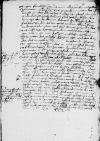Uns ist vorkomen, wie das Ewer Herlichkeit bericht ist, / das der erslagne ⌊gardian⌋ sanct Franciscus ordens unser stadt ⌊Colmen⌋ solde im kloster bey dem ⌊apt von der Kronen⌋, / dieweil her messe heth gehalten, vor den altar aus anderer krancheit nidergefallen sein / und bald darnoch gestorben, / das uns nicht wenig vorwundert, / wie leut solchs mugen reden, / so wir des ein entlichen bescheidt haben von des gedochtnn klosters apt, / ouch von dem, der des ermortenn gardians beichtvater ist gewest. / In seynem leczstenn, / das er aus grossen smerczen und wetagen, die im von handlen und slegenn, wie wir Ewer Herlichkeit zuvor ⌊⌋, sein werden erbermiglich vorscheiden ist im ostertage, des wir gutten schein und beweis haben, derwegen wir uns nicht voereylet, wie Ewer Herlichkeit mey[n]et mit unsermm schreyben an den hern ⌊erzbischoff⌋ / oder mit unsernn processen, / die wir derwegen, / von pflicht unsers ampts, haben mussen lossen ausghen. / Das aber Ewer Herlichkeit derweil nymant klagt, / nichts darzu thun wil, / losse wir so bleibnn. / Wir thun in nicht furdren. / Ewer Herlichkeit weis, was den, die uff freyer koniglichen strossen imant geweldigen noch rechte geschen sol. / Wir haben, / Got weis, / nicht gernn das darzu gethon, / das wir schuldig. / Wil Ewer Herlichkeit konigliche strosse nicht rein halten und gerechtigheit uber ubelteter thun von wegen ⌊koniglichen majestet⌋ und des ampts, das Ewer Herlichkeit befholen, werdenn ander den wir daruber klagen. / Dis hab wir Ewer Herlichkeit unser nottorfft noch, / do mit wir nicht geacht wurden, das wir uns an rechte wissenheit und grundt uber imants in unserm stande voreylen soltenn, / gothe dem almechtigen befholen nicht mugen bergen.
